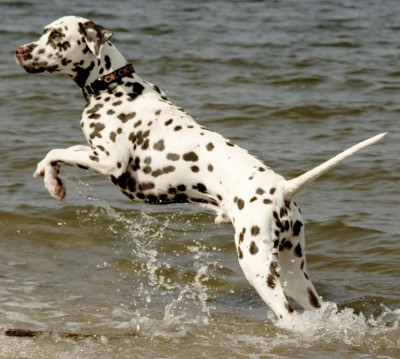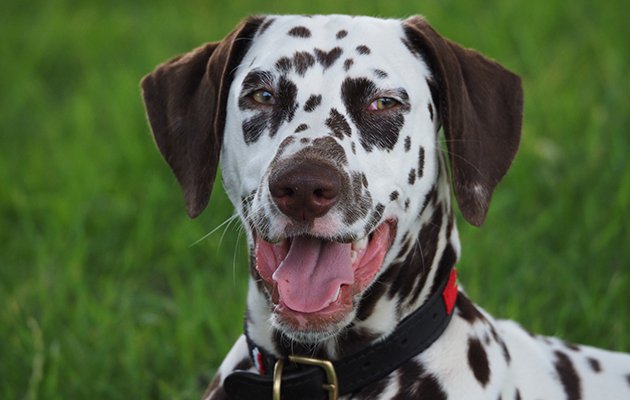Dalmatians, known for their stunning spots, are often regarded as a symbol of elegance and beauty. However, beneath their striking appearance lies a surprising reality – Dalmatians are prone to numerous health issues. These dogs, popularized by movies like “101 Dalmatians,” face a variety of genetic conditions that can affect their overall well-being.
Originating from Croatia, Dalmatians have a long history of health problems. One of the most notorious issues they face is deafness, which affects around 30% of the breed. In addition to deafness, Dalmatians are prone to skin allergies, urinary tract problems, and certain types of cancer. It is crucial for potential Dalmatian owners to be aware of these health concerns and to provide regular veterinary check-ups and proper care to ensure the best quality of life for these beloved dogs.
Dalmatians are known to have a few specific health issues that can occur more frequently compared to other dog breeds. These health issues include deafness, skin allergies, urinary stones, and certain autoimmune disorders. However, it’s important to note that not all Dalmatians will experience these problems. Proper care, regular check-ups, and a balanced diet can help minimize the risk of health issues. Consult a veterinarian for specific guidance based on your Dalmatian’s individual needs.

Do Dalmatians Have a Lot of Health Issues?
Dalmatians are popular and beloved dogs, known for their unique coat pattern and energetic personalities. However, one question that often arises for prospective Dalmatian owners is whether these dogs have a lot of health issues. In this article, we will explore the common health concerns associated with Dalmatians and provide insights into their overall well-being.
1) Genetic Predispositions
Dalmatians have a genetic predisposition to certain health issues. The most well-known and common condition is urinary stones, specifically urate stones. These stones can cause discomfort, pain, and urinary tract blockages if not managed properly. Dalmatians have a unique metabolism that leads to the overproduction of uric acid, which contributes to stone formation. A proper diet, monitoring urinary pH levels, and ensuring ample hydration are key in preventing and managing this condition.
Additionally, Dalmatians are susceptible to hereditary deafness. Studies have shown that approximately 8% of Dalmatians are born deaf in one or both ears. It is crucial for breeders to conduct hearing tests and ensure responsible breeding practices to reduce the occurrence of deafness within the breed. However, deafness does not hinder a Dalmatian’s ability to live a happy and fulfilling life. With proper training and attention, they can thrive just like any other dog.
Furthermore, Dalmatians may also be prone to certain skin allergies and autoimmune disorders. Regular grooming, a balanced diet, and proper veterinary care can help mitigate these issues. Early detection and prompt treatment are crucial for managing any potential health problems in Dalmatians.
2) Exercise-Induced Health Concerns
Dalmatians are known to be highly energetic and require regular exercise to keep them happy and healthy. However, their predisposition to certain health concerns should be considered when developing an exercise routine. Dalmatians are prone to hip dysplasia, a condition where the hip joint does not develop properly. Vigorous exercise or excessive jumping during their growth phase can exacerbate this condition. It is essential to provide Dalmatians with appropriate exercise and avoid strenuous activities that could potentially harm their joints.
Another concern related to exercise is heat intolerance. Dalmatians have a lower tolerance for heat compared to other breeds. Their short coat and lack of sweat glands make it challenging for them to regulate their body temperature efficiently. Owners should take extra precautions by ensuring access to shade, providing plenty of water, and avoiding exercise during the hottest hours of the day. Heatstroke can occur rapidly and can be life-threatening, so it is crucial to keep Dalmatians cool and comfortable in warmer climates.
Bloat, or gastric dilatation-volvulus (GDV), is another serious health concern that can affect Dalmatians. This condition occurs when the stomach fills with gas and twists, causing a life-threatening situation. While the exact cause of bloat is unknown, certain factors such as eating too quickly, exercising immediately after meals, and feeding from raised bowls may contribute to the risk. To reduce the likelihood of bloat, it is recommended to feed Dalmatians multiple small meals throughout the day, ensure they eat at a slower pace, and avoid vigorous exercise before and after meals.
3) Vision Problems
Dalmatians are prone to several vision problems that can impact their overall health and quality of life. One common condition is progressive retinal atrophy (PRA), which causes a gradual deterioration of the retina. This can lead to vision loss and eventually blindness. PRA is hereditary, and responsible breeding practices that involve regular eye screenings are essential in reducing its occurrence within the breed.
In addition to PRA, Dalmatians may also experience other eye disorders such as cataracts and corneal dystrophy. Regular eye examinations with a veterinary ophthalmologist can help detect and manage these conditions early on, ensuring the best possible vision for Dalmatians throughout their lives.
It is important to note that while Dalmatians may be predisposed to certain health issues, not all individuals will experience them. Responsible breeding practices, regular veterinary check-ups, and proper care can significantly contribute to the overall health and well-being of Dalmatians.
The Importance of Routine Veterinary Care
Dalmatians, like any other breed, benefit greatly from regular veterinary care. Routine check-ups, vaccinations, and preventive measures can help identify and address potential health issues before they become more serious. Establishing a good relationship with a trusted veterinarian and following their recommendations for vaccinations, parasite prevention, and overall wellness care is crucial for maintaining the health and happiness of your Dalmatian.
Dalmatians and Their Unique Health Needs
When considering a Dalmatian as a pet, it is important to be aware of their unique health needs. Here are three key areas to focus on:
1) Diet and Hydration
Due to their predisposition to urinary stones, Dalmatians require a specific diet that helps manage their uric acid levels. A low-purine diet is often recommended to prevent the formation of urate stones. It is important to consult with a veterinarian and choose a high-quality, balanced diet that meets the specific needs of your Dalmatian. Additionally, ensuring they have access to clean water at all times is essential for maintaining proper hydration and urinary health.
2) Exercise and Mental Stimulation
Regular exercise is crucial for the physical and mental well-being of Dalmatians. Engaging in activities such as walking, running, playing fetch, or even participating in dog sports can help them burn off excess energy and stay in shape. Mental stimulation is equally important, as Dalmatians are intelligent and thrive on learning and problem-solving. Incorporating training sessions, puzzle toys, and interactive games into their routine can keep their minds sharp and prevent boredom-related behaviors.
3) Preventive Care
Preventive care plays a vital role in ensuring the overall health and longevity of Dalmatians. Regularly grooming their coat, cleaning their ears, and monitoring their skin for any signs of irritation or allergies is important. Additionally, maintaining a dental hygiene routine that includes regular teeth brushing and dental check-ups can help prevent dental diseases that are common in Dalmatians.
Conclusion
Dalmatians, like any other breed, have their own set of health concerns. While they may be more prone to certain conditions, it is important to note that not all individuals will be affected. With proper care, attention to their unique needs, and regular veterinary check-ups, Dalmatians can live happy and healthy lives. Understanding their genetic predispositions and taking preventive measures can greatly contribute to their overall well-being. If you are considering adding a Dalmatian to your family, it is important to be prepared for their specific health needs and provide them with the love and care they deserve.
Key Takeaways: Do Dalmatians Have a Lot of Health Issues?
- Dalmatians are prone to certain health issues due to their genetics.
- One of the most common health problems in Dalmatians is urinary tract issues.
- They are also prone to developing bladder stones, which can be painful.
- Dalmatians may experience allergies and skin problems.
- Regular vet check-ups and a balanced diet are important for their overall health.
Frequently Asked Questions
Below are some frequently asked questions about the health issues commonly associated with Dalmatians.
1. What are some common health issues that Dalmatians may face?
Dalmatians are prone to several health issues, including deafness, bladder stones, and skin allergies. Deafness is especially prevalent among Dalmatians, with around 30% of them being unilaterally or bilaterally deaf. Bladder stones, which can cause urinary problems, are also common due to a genetic predisposition. Additionally, Dalmatians are prone to developing skin allergies, such as atopic dermatitis or contact dermatitis.
It’s important to note that not all Dalmatians will experience these health issues, but it’s crucial for owners to be aware of the potential risks and take proactive steps to ensure their dog’s well-being.
2. Can anything be done to prevent deafness in Dalmatians?
While some cases of deafness in Dalmatians are genetic and cannot be prevented, there are proactive measures that owners can take. It’s recommended to have all Dalmatian puppies undergo a hearing test as early as possible, ideally between six to eight weeks of age. This can help identify any potential hearing issues and guide appropriate training and communication techniques.
It’s also important to avoid breeding Dalmatians with a known hearing impairment, as this can contribute to the prevalence of deafness in the breed. Responsible breeding practices can help reduce the occurrence of deafness in future generations of Dalmatians.
3. How can bladder stones be managed in Dalmatians?
Bladder stones are a common health issue in Dalmatians due to their unique urinary system. To manage bladder stones, a specialized diet that helps control the pH levels in the urine is often recommended. This diet is low in purines, which are substances that can contribute to the formation of bladder stones.
In severe cases, surgery may be necessary to remove the bladder stones. Regular check-ups with a veterinarian are essential to monitor and manage any urinary problems, and to promptly address any issues that may arise.
4. How can I prevent or manage skin allergies in my Dalmatian?
Preventing and managing skin allergies in Dalmatians often involves identifying and avoiding triggers. This may include avoiding certain foods, environmental allergens, or using hypoallergenic grooming products. Regular bathing with gentle, hypoallergenic shampoos can also help soothe the skin and reduce the risk of allergies.
If your Dalmatian develops skin allergies, consult a veterinarian for appropriate treatment options, such as antihistamines or prescribed medication. Regular check-ups can help monitor your dog’s skin health and address any concerns promptly.
5. Are there any other specific health concerns I should be aware of for Dalmatians?
Aside from the aforementioned health issues, Dalmatians may also be prone to certain conditions like hip dysplasia, hyperuricemia, and certain eye disorders. Regular veterinary care, a balanced diet, and regular exercise can help mitigate these risks and promote overall health and well-being. It’s important to stay informed and work closely with your veterinarian to ensure the best possible care for your Dalmatian.

The truth about Dalmatians | Beautiful dog breed
Summary
Dalmatians, those adorable spotted dogs, are prone to certain health issues. While they’re known for their distinctive coat pattern, they also have a higher risk of deafness compared to other breeds. It’s important for potential owners to be aware of this potential health concern. Additionally, Dalmatians can also experience urinary tract problems, so they require a specific diet and plenty of water to keep their kidneys healthy. Despite these health challenges, Dalmatians can still lead happy and fulfilling lives with proper care and attention.
